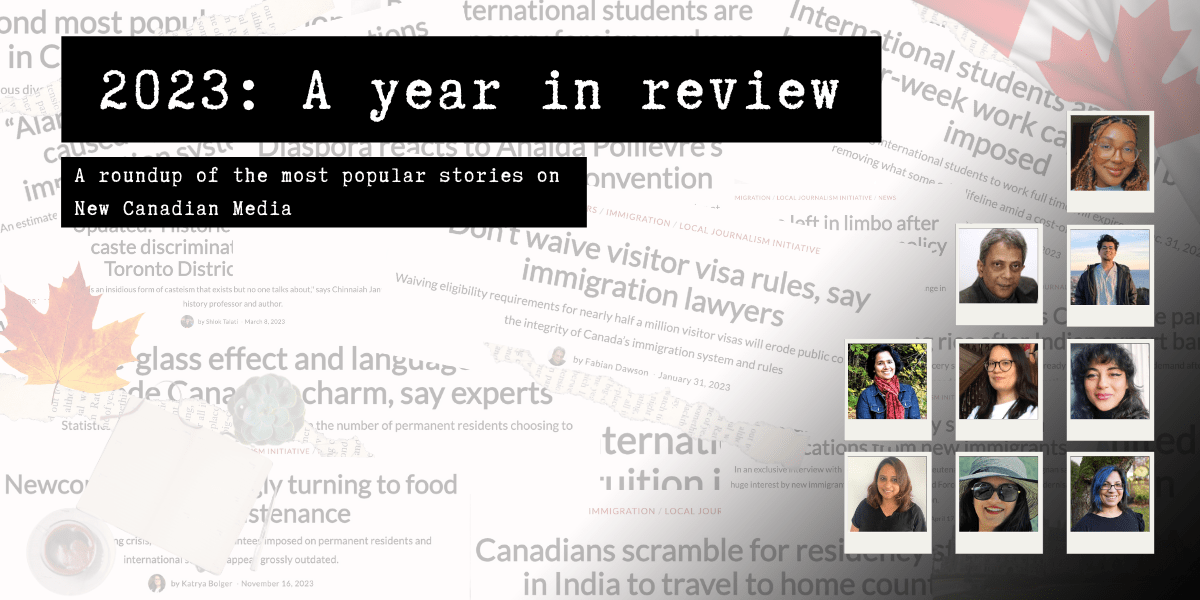In a year that has been dominated by conflict and ecological disaster, the news cycle has been relentless: Israel. Hamas. Ukraine. Russia. Refugees. Inflation. Housing. Scarcity and need.
Through all of that, members of our Collective have been diligently working from coast to coast, telling stories from an immigrant’s perspective, with a cumulative hundreds of thousands of pageviews on newcanadianmedia.ca and untold thousands on our partner news sites through the Local Journalism Initiative.
You’ll find a list below of some of our top stories from 2023.
JANUARY
 Canada’s health care crisis was brought into focus in Minu Mathew’s story in January about a Nigerian nurse who came to Canada with a bachelor of nursing degree from her home country, two years of experience, and then went on to spend $33,000 for a master’s in nursing from Thompson Rivers University in B.C. Although she was at first granted permission to write the National Council Licensure Examination to become an RN, she was later denied permission to write the exam.
Canada’s health care crisis was brought into focus in Minu Mathew’s story in January about a Nigerian nurse who came to Canada with a bachelor of nursing degree from her home country, two years of experience, and then went on to spend $33,000 for a master’s in nursing from Thompson Rivers University in B.C. Although she was at first granted permission to write the National Council Licensure Examination to become an RN, she was later denied permission to write the exam.
“I felt my life ended that day and was consumed by suicidal thoughts,” said Temilola Olaleye. “I put in everything that I had — time and money on tutorials, materials and classes and all of a sudden on Dec. 19, I received a letter saying I was no longer eligible as there was a new policy in place for IENs [Internationally Educated Nurses].”
FEBRUARY
 After months and months of horrific backlogs, it was reported that the federal government was considering implementing extraordinary measures to reduce its backlog of immigration applications, including waiving eligibility requirements for nearly half a million visitor visas.
After months and months of horrific backlogs, it was reported that the federal government was considering implementing extraordinary measures to reduce its backlog of immigration applications, including waiving eligibility requirements for nearly half a million visitor visas.
However, as Fabian Dawson, New Canadian Media’s senior writer, reported on the last day of January, Canada’s immigration lawyers were not happy with that idea.
“It is counterproductive to repairing trust in Immigration Refugee Citizenship Canada (IRCC), which is one of the intended goals of this proposed new measure,” said the Canadian Immigration Lawyers Association (CILA).
“If the criterion for approval is unilaterally waived, this will erode public confidence in the integrity of Canada’s immigration system and rules, not rebuild trust. The public will fear a spike in the number of individuals who overstay; work without authorization due to insufficient funds; or make refugee claims,” CILA said in a statement posted on its website.
The story was the most popular one on newcanadianmedia.ca in February.
March

In March, readers were focused on health care and other issues, however, a story by Shlok Talati about caste discrimination captured attention. In an historic motion, the Toronto District School Board approved a motion to address caste-based discrimination in a 16-5 vote, making it the first jurisdiction in Canada to seek a formal mechanism for reporting this type of prejudice.
“There is no category to record caste, so it is not being recorded as caste,” said Yalini Rajakulasingam, the TDSB trustee who put forth the motion. “This does not mean it’s not happening.”
April

In April, health care, housing, international students and, of course, immigration were front and centre for readers of newcanadianmedia.ca. However, a story about immigrants in the Canadian military, by Fabian Dawson, captured the most attention for a story written in that month.
In an exclusive interview, Lieutenant-General Jennie Carignan told New Canadian Media that the huge interest by new immigrants to join Canada’s Armed Forces bodes well for the modernisation of the institution. In fact, more than 6,000 new immigrants had applied to join the CAF in just two months after the military dropped citizenship requirements to bolster its ranks.
“We have seen a huge interest from new Canadians since we’ve opened the door to permanent residents,” Carignan, the military’s Chief of Professional Conduct and Culture, told NCM.
“The number of folks from different backgrounds…new Canadians, has increased from 23 per cent to over 30 per cent of applicants,” she said. “This is very, very good news.”
May

In May, a story about Canada’s declining appeal among immigrants moved to the top of our website, with Minu Mathew reporting on the troubling fact that data from Statistics Canada showed a steep decline in the number of permanent residents choosing to become Canadian citizens.
In 2022, Canada welcomed a historic 431,645 permanent residents to the country. In contrast, 221,919 immigrants became Canadian citizens – the lowest percent ever, according to Statistics Canada data obtained by the Institute for Canadian Citizenship (ICC).
Why the decline? Experts figure language barriers and Canada’s so-called triple glass gate are the reasons. Namely, professional certification issues, trouble accessing high-paying jobs, and hitting a glass ceiling, which prevents newcomers from becoming managers.
The charm of the new country wears off, experts say.
June

The plight of international students in Canada has been well documented by New Canadian Media. In June, NCM’s Kaitlyn Smith reported about a survey that said B.C. international students are the province’s new temporary foreign workers, stuck without work in their fields.
The survey revealed that while B.C. attracts some of the highest numbers of international students intending to stay in Canada, it has the lowest rate of permanent residency offers.
The survey involved 1,300 international students at Langara College in Vancouver and the College of New Caledonia in Prince George. Researchers found that the vast majority — 70 per cent — of international students who have acquired a bachelor’s degree, after having paid up to five times as much in tuition as domestic students, did not acquire permanent residency within 10 years of living in Canada.
Those who completed a masters or doctoral program had better odds, at 50 and 60 per cent respectively.
July

In July, tens of thousands of readers flocked to newcanadianmedia.ca to read Shilpashree Jagannathan’s piece about South Asians across Canada panic buying rice after an Indian export ban.
Rice is a fundamental staple in South Asian diets — a demographic that makes up 7.1 per cent of Canada or over 2.5 million people, according to the 2021 census.
Iqbal Halal Foods, a prominent Indian grocery store in Toronto, saw a surge in Indian customers flocking to their store to purchase non-Basmati rice. The store was compelled to ration rice sales. Panchvati Supermarket, another Indian retail grocery chain in Ontario, had similar restrictions.
August


The rice issue continued to make headlines in August, but the international student issue once again pushed its way to the forefront with Kaitlyn Smith’s and Serena Austin’s investigation that found International students face unlimited tuition increases at most Canadian institutions, while prices for domestic or in-province students remained at a fixed rate.
“Lacking a cap on how much tuition can be raised, and less financial aid services than the Canadian students,” are among the most common complaints from international students, said Damanpreet Singh, international student representative for the Canadian Federation of Students.
September

Readers were particularly interested in the international student issue again in September, as well as reading about the popularity of Islam and Ukrainian refugees who applied to come to Canada but never showed up.
But the most popular story written in September was focused on politics, and the story of Anaida Poilievre, an immigrant from Venezuela, who introduced her husband Pierre, the new Conservative leader, at his inaugural party convention as leader. One person interviewed by NCM said, although he had never heard of Anaida Poilievre and does not align with the views of the Conservative Party, he was moved to tears by the speech.
“I felt very identified as an immigrant, I identified 100 hundred percent,” he said when talking about Anaida Poilievre’s section of the speech when she mentioned the story of her father, who she told the audience was a bank manager in Venezuela before coming to Canada and working in the Quebec fields picking fruits and vegetables to support his family.
October

The killing of Sikh leader Hardeep Singh Nijjar outside a gurdwara in Surrey, B.C., and Prime Minister Justin Trudeau’s subsequent revelation that Canadian authorities were investigating links between India’s government and the June 18 murder has dominated headlines in the media for months.
After India suspended visa services in Canada, in September, NCM’s story on Canadians scrambling for residency status in India so they could visit their families got the most views. The story continued to dominate in November.
November

The top story produced in November was written by NCM’s Katrya Bolger, which examined how newcomers are being compelled to turn to food banks in the wake of Canada’s cost-of-living crisis.
Kirstin Beardsley, CEO of Food Banks Canada, told Bolger that the increasing reliance on food banks shows cracks in the country’s social safety system. “The report exposes how deeply broken our social safety net is, that when folks come to Canada, they have to rely on food banks. It also speaks to the need for increased government investment to support them.”
December

December’s stop story was published at the end of November, and it also was written by Katrya Bolger. It focused on anxiety over a pilot project allowing international students to work full time, which was to expire on Dec. 31, 2023, removing what some call a lifeline amid a cost-of-living crisis.
The most popular story actually written in December was penned by Fernando Arce on the alarming number of deportations from Canada. Arce reported that an estimated 500,000 migrants with precarious or undocumented status including migrant workers, students and failed asylum seekers are currently in Canada.
Paul Bucci is an award-winning journalist and editor who has worked in senior management positions at some of Canada’s largest media companies. A former legislature journalist with reporting stints in Somalia and Bosnia, Bucci has been executive editor of New Canadian Media since April 2023.


